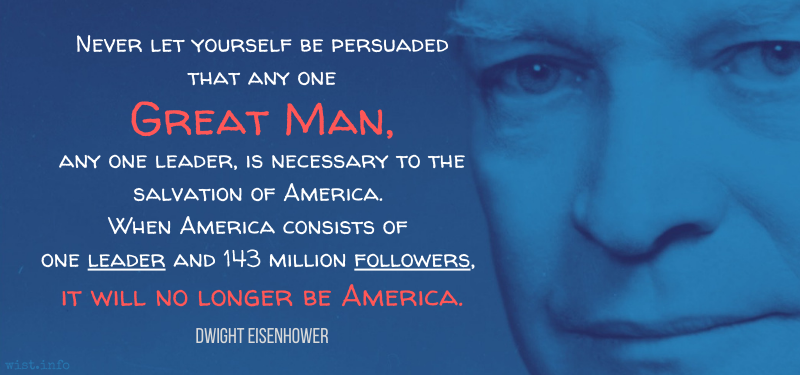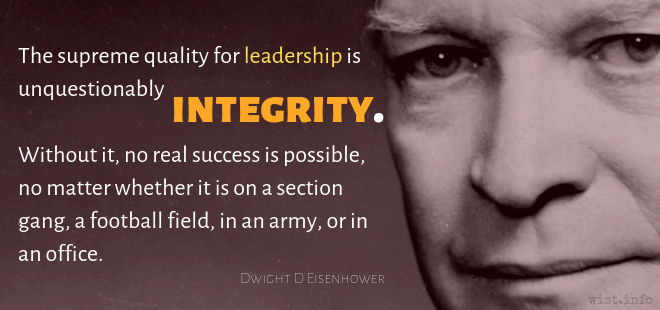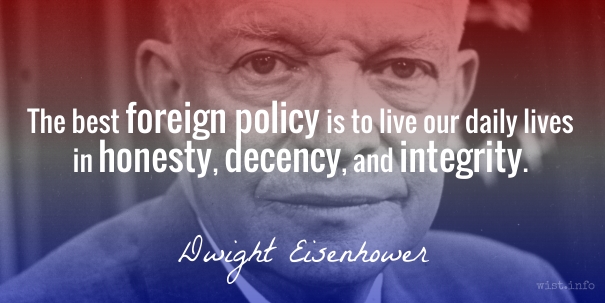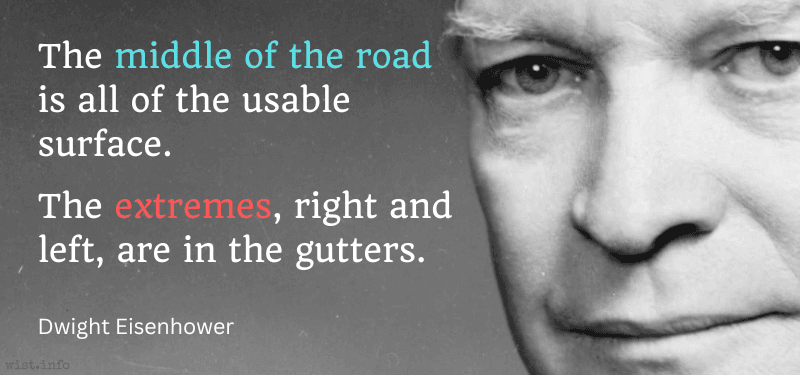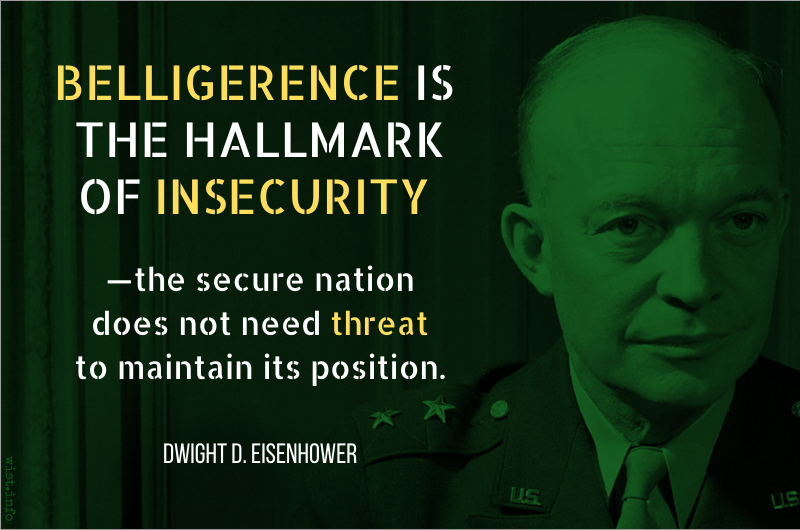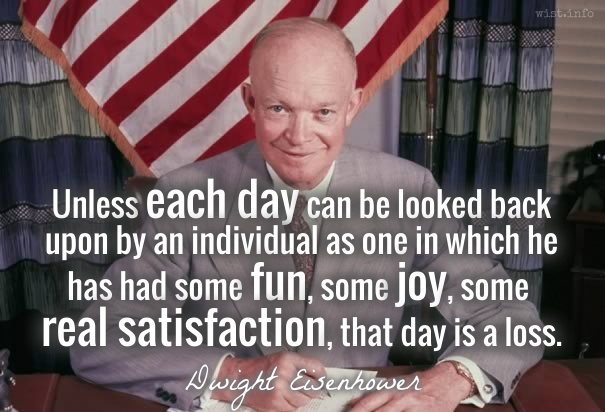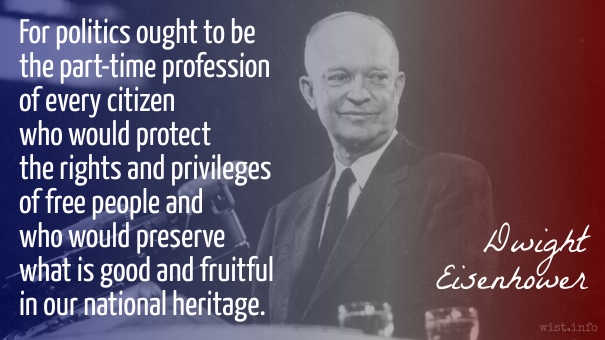Never let yourself be persuaded that any one Great Man, any one leader, is necessary to the salvation of America. When America consists of one leader and 143,000,000 followers, it will no longer be America. Truly American leadership is not of any one man. It is of multitudes of men — and women.
Dwight David Eisenhower (1890-1969) American general, US President (1953-61)
“An Open Letter to America’s Students,” Reader’s Digest (1948-10)
(Source)
Quoted in different locations with various numbers for the US population. The letter was written while Eisenhower was President of Columbia University.
Quotations by:
Eisenhower, Dwight David
The peace we seek and need means much more than mere absence of war. It means the acceptance of law, and the fostering of justice, in all the world.
In the councils of government, we must guard against the acquisition of unwarranted influence, whether sought or unsought, by the military-industrial complex. The potential for the disastrous rise of misplaced power exists and will persist.
Dwight David Eisenhower (1890-1969) American general, US President (1953-61)
“Farewell Address” (17 Jan 1961)
(Source)
The older I get, the more wisdom I find in the ancient rule of taking first things first — a process which often reduces the most complex human problems to manageable proportions.
I know something about that war, and I never want to see that history repeated. But, my fellow Americans, it certainly can be repeated if the peace-loving democratic nations again fearfully practice a policy of standing idly by while big aggressors use armed force to conquer the small and weak.
But all history has taught us the grim lesson that no nation has ever been successful in avoiding the terrors of war by refusing to defend its rights — by attempting to placate aggression.
The way chosen by the United States was plainly marked by a few clear precepts, which govern its conduct in world affairs.
First: No people on earth can be held, as a people, to be enemy, for all humanity shares the common hunger for peace and fellowship and justice.
Second: No nation’s security and well-being can be lastingly achieved in isolation but only in effective cooperation with fellow-nations.
Third: Any nation’s right to form of government and an economic system of its own choosing is inalienable.
Fourth: Any nation’s attempt to dictate to other nations their form of government is indefensible.
And fifth: A nation’s hope of lasting peace cannot be firmly based upon any race in armaments but rather upon just relations and honest understanding with all other nations.
Every gun that is made, every warship launched, every rocket fired signifies, in the final sense, a theft from those who hunger and are not fed, those who are cold and are not clothed. This world in arms is not spending money alone. It is spending the sweat of its laborers, the genius of its scientists, the hopes of its children.
The cost of one modern heavy bomber is this: a modern brick school in more than 30 cities. It is two electric power plants, each serving a town of 60,000 population. It is two fine, fully equipped hospitals. It is some 50 miles of concrete highway. We pay for a single fighter with a half million bushels of wheat. We pay for a single destroyer with new homes that could have housed more than 8,000 people.
This, I repeat, is the best way of life to be found on the road the world has been taking. This is not a way of life at all, in any true sense. Under the cloud of threatening war, it is humanity hanging from a cross of iron.
The supreme quality for leadership is unquestionably integrity. Without it, no real success is possible, no matter whether it is on a section gang, a football field, in an army, or in an office. If a man’s associates find him guilty of phoniness, if they find that he lacks forthright integrity, he will fail. His teachings and actions must square with each other. The first great need, therefore, is integrity and high purpose.
Un-American activity cannot be prevented or routed out by employing un-American methods; to preserve freedom we must use the tools that freedom provides.
In most communities it is illegal to cry “fire” in a crowded assembly. Should it not be considered serious international misconduct to manufacture a general war scare in an effort to achieve local political aims?
I like to believe that people, in the long run, are going to do more to promote peace than our governments. Indeed, I think that people want peace so much that one of these days governments had better get out of the way and let them have it.
But finally, there is one other quality I would mention among these that I believe will fit you for difficult and important posts. This is a healthy and lively sense of humor.
Don’t join the book burners. Don’t think you are going to conceal thoughts by concealing evidence that they ever existed. Don’t be afraid to go in your library and read every book, as long as that document does not offend your own ideas of decency. That should be the only censorship.
Hope spurs humans everywhere to work harder, to endure more now, that the future may be better.
Dwight David Eisenhower (1890-1969) American general, US President (1953-61)
Gabriel Silver Lecture, McMillin Academic Theater, Columbia U., New York (23 Mar 1950)
Full text.
The best foreign policy is to live our daily lives in honesty, decency, and integrity; at home, making our own land a more fitting habitation for free men; and abroad, joining with those of like mind and heart, to make of the world a place where all men can dwell in peace.
Dwight David Eisenhower (1890-1969) American general, US President (1953-61)
Inaugural Gabriel Silver lecture, Columbia University (23 Mar 1950)
But I think a life of raising prize cattle, going shooting two or three times a year, fishing in the summer, and interspersing the whole thing with some golf and bridge — and whenever I felt like talking or writing, doing it with abandon and with no sense of responsibility whatsoever — maybe such a life wouldn’t be so bad.
But we know that freedom cannot be served by the devices of the tyrant. As it is an ancient truth that freedom cannot be legislated into existence, so it is no less obvious that freedom cannot be censored into existence. And any who act as if freedom’s defenses are to be found in suppression and suspicion and fear confess a doctrine that is alien to America.
But the most interesting — although horrible — sight that I encountered during the trip was a visit to a German internment camp near Gotha. The things I saw beggar description. While I was touring the camp I encountered three men who had been inmates and by one ruse or another had made their escape. I interviewed them through an interpreter. The visual evidence and the verbal testimony of starvation, cruelty and bestiality were so overpowering as to leave me a bit sick. In one room, where there were piled up twenty or thirty naked men, killed by starvation, George Patton would not even enter. He said he would get sick if he did so. I made the visit deliberately, in order to be in position to give first-hand evidence of these things if ever, in the future, there develops a tendency to charge these allegations merely to “propaganda”.
I believe that the United States as a government, if it is going to be true to its own founding documents, does have the job of working toward that time when there is no discrimination made on such inconsequential reason as race, color, or religion.
I have said time and again there is no place on this earth to which I would not travel, there is no chore I would not undertake if I had any faintest hope that, by so doing, I would promote the general cause of world peace.
People talk about the middle of the road as though it were unacceptable. Actually, all human problems, excepting morals, come into the gray areas. Things are not all black and white. There have to be compromises. The middle of the road is all of the usable surface. The extremes, right and left, are in the gutters.
Dwight David Eisenhower (1890-1969) American general, US President (1953-61)
Note (Nov 1963)
(Source)
The earliest reference I could find was second-hand, in William Safire, The New Language of Politics, "middle of the road" (1968) (later published as Safire's Political Dictionary, and including the entry through the 2008 edition).
When I found the first camp like that I think I never was so angry in my life. The bestiality displayed there was not merely piled up bodies of people that had starved to death, but to follow out the road and see where they tried to evacuate them so they could still work, you could see where they sprawled on the road. You could go to their burial pits and see horrors that really I wouldn’t even want to begin to describe. I think people ought to know about such things. It explains something of my attitude toward the German war criminal. I believe he must be punished, and I will hold out for that forever.
I despise all adjectives that try to describe people as liberal or conservative, rightist or leftist, as long as they stay in the useful part of the road. Even more, I despise those who go to the gutter on either the right or the left, and hurl rocks at those in the center.
Dwight David Eisenhower (1890-1969) American general, US President (1953-61)
Speech at Birthday Celebration, Washington (Oct 1963)
(Source)
We cannot safely confine government programs to our own domestic progress and our own military power. We could be the wealthiest and the most mighty nation and still lose the battle of the world if we do not help our world neighbors protect their freedom and advance their social and economic progress. It is not the goal of the American people that the United States should be the richest nation in the graveyard of history.
If all that Americans want is security, they can go to prison. They’ll have enough to eat, a bed and a roof over their heads. But if an American wants to preserve his dignity and his equality as a human being, he must not bow his neck to any dictatorial government.
Today in America unions have a secure place in our industrial life. Only a handful of unreconstructed reactionaries harbor the ugly thought of breaking unions. Only a fool would try to deprive working men and women of the right to join the union of their choice.
I have no use for those — regardless of their political party — who hold some foolish dream of spinning the clock back to days when unorganized labor was a huddled, almost helpless mass.
Belligerence is the hallmark of insecurity — the secure nation does not need threat to maintain its position.
Dwight David Eisenhower (1890-1969) American general, US President (1953-61)
Speech, American Newspaper Publishers Assoc, New York City (25 Apr 1946)
(Source)
The first part of the above was a common phrase of Eisenhower's.
Arms alone can give the world no permanent peace, no confident security. Arms are solely for defense — to protect from violent assault what we already have. They are only a costly insurance. They cannot add to human progress.
Censorship, in my opinion, is a stupid and shallow way of approaching the solution to any problem. Though sometimes necessary, as witness a professional and technical secret that may have a bearing upon the welfare and very safety of this country, we should be very careful in the way we apply it, because in censorship always lurks the very great danger of working to the disadvantage of the American nation.
Possibly my hatred of war blinds me so that I cannot comprehend the arguments they adduce. But, in my opinion, there is no such thing as a preventive war. Although this suggestion is repeatedly made, none has yet explained how war prevents war. Worse than this, no one has been able to explain away the fact that war creates the conditions that beget war.
Teachers need our active support and encouragement. They are doing one of the most necessary and exacting jobs in the land. They are developing our most precious national resource: our children, our future citizens.
Here in America we are descended in blood and spirit from revolutionaries and rebels — men and women who dared to dissent from accepted doctrine. As their heirs, may we never confuse honest dissent with disloyal subversion.
Unless each day can be looked back upon by an individual as one in which he has had some fun, some joy, some real satisfaction, that day is a loss. It is un-Christian and wicked, in my opinion, to allow such a thing to occur.
Dwight David Eisenhower (1890-1969) American general, US President (1953-61)
Speech, Commencement, Dartmouth College (14 Jun 1953)
(Source)
One of the things that I noticed in war was how difficult it was for our soldiers, at first, to realize that there are no rules to war. Our men were raised in sports, where a referee runs a football game, or an umpire a baseball game, and so forth.
Now I think, speaking roughly, by leadership we mean the art of getting someone else to do something that you want done because he wants to do it, not because your position of power can compel him to do it, or your position of authority. A commander of a regiment is not necessarily a leader. He has all of the appurtenances of power given by a set of Army regulations by which he can compel unified action. He can say to a body such as this, “Rise,” and “Sit down.” You do it exactly. But that is not leadership.
Labor is the United States. The men and women who, with their minds, their hearts and hands, create the wealth that is shared in this country — they are America.
If a political party does not have its foundation in the determination to advance a cause that is right and that is moral, then it is not a political party; it is merely a conspiracy to seize power.
Dwight David Eisenhower (1890-1969) American general, US President (1953-61)
Speech, Fourth Annual Republican Women’s National Conference, Washington, DC (6 Mar 1956)
(Source)
War is mankind’s most tragic and stupid folly; to seek or advise its deliberate provocation is a black crime against all men. Though you follow the trade of the warrior, you do so in the spirit of Washington — not of Genghis Khan. For Americans, only threat to our way of life justifies resort to conflict.
I tell this story to illustrate the truth of the statement I heard long ago in the Army: Plans are worthless, but planning is everything.
Dwight David Eisenhower (1890-1969) American general, US President (1953-61)
Speech, National Defense Executive Reserve Conference (14 Nov 1957)
Quoted in R. Nixon, Six Crises, "Krushchev" (1962) as "In preparing for battle I have always found that plans are useless, but planning is indispensable." Sometimes paraphrased as "Plans are nothing; planning is everything."
I tell this story to illustrate the truth of the statement I heard long ago in the Army: Plans are worthless, but planning is everything. There is a very great distinction because when you are planning for an emergency you must start with this one thing: the very definition of ’emergency’ is that it is unexpected, therefore it is not going to happen the way you are planning.
Because, therefore, we are defending a way of life, we must be respectful of that way of life as we proceed to the solution of our problem. We must not violate its principles and its precepts, and we must not destroy from within what we are trying to defend from without.
Thank goodness, many years ago, I had a preceptor, for whom my admiration has never died, and he had a favorite saying, one that I trust I try to live by. It was: always take your job seriously, never yourself.
The essence of leadership is to get others to do something because they think you want it done and because they know it is worth while doing — that is what we are talking about.
For politics ought to be the part-time profession of every citizen who would protect the rights and privileges of free people and who would preserve what is good and fruitful in our national heritage. Politics must be the concern of every citizen who wants to see our national well-being increased and our international leadership strengthened. In that combined sense, politics is the noblest of professions. In the ranks of that kind of politics, every American should be enrolled.
Dwight David Eisenhower (1890-1969) American general, US President (1953-61)
Speech, Republican Lincoln Day Dinners (28 Jan 1954)
(Source)
Often paraphrased: "Politics ought to be the part-time profession of every citizen who would protect the rights and privileges of free men."
The speech was filmed for the Republican National Committee and distributed to state and local committees to be shown at the Lincoln Day dinners.
Now I realize that on any particular decision a very great amount of heat can be generated. But I do say this: life is not made up of just one decision here, or another one there. It is the total of the decisions that you make in your daily lives with respect to politics, to your family, to your environment, to the people about you. Government has to do that same thing. It is only in the mass that finally philosophy really emerges.
As long as I am back in my military life for a second, I should like to observe one thing about leadership that one of the great has said — Napoleon. He said, the great leader, the genius in leadership, is the man who can do the average thing when everybody else is going crazy.
The job of getting people really wanting to do something is the essence of leadership. And one of the things a leader needs occasionally is the inspiration he gets from the people he leads. The old tactical textbooks say that the commander always visits his troops to inspire them to fight. I for one soon discovered that one of the reasons for my visiting the front lines was to get inspiration from the young American soldier. I went back to my job ashamed of my own occasional resentments or discouragements, which I probably — at least I hope I concealed them.
In vast stretches of the earth, men awoke today in hunger. They will spend the day in unceasing toil. And as the sun goes down they will still know hunger. They will see suffering in the eyes of their children. Many despair that their labor will ever decently shelter their families or protect them against disease. So long as this is so, peace and freedom will be in danger throughout our world. For wherever free men lose hope of progress, liberty will be weakened and the seeds of conflict will be sown.
My life has been largely spent in affairs that required organization. But organization itself, necessary as it is, is never sufficient to win a battle.
Freedom has been defined as the opportunity for self-discipline. Should we persistently fail to discipline ourselves, eventually there will be increasing pressure on government to redress the failure. By that process freedom will step by step disappear.
Government can do a great deal to aid the settlement of labor disputes without allowing itself to be employed as an ally of either side. Its proper role in industrial strife is to encourage the process of mediation and conciliation.
Our real problem, then, is not our strength today; it is rather the vital necessity of action to ensure our strength tomorrow.
Dwight David Eisenhower (1890-1969) American general, US President (1953-61)
State of the Union message (9 Jan 1958)
War is a grim, cruel business, a business justified only as a means of sustaining the forces of good against those of evil.
Dwight David Eisenhower (1890-1969) American general, US President (1953-61)
United War Fund appeal (11 Sep 1945)
(Source)

